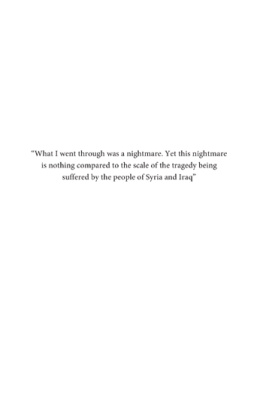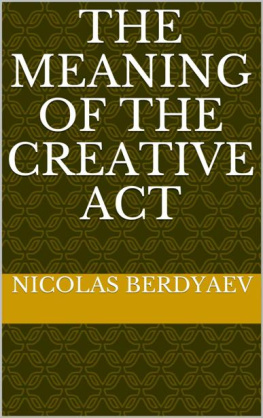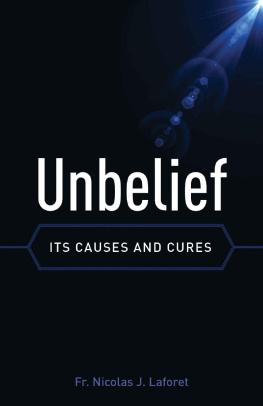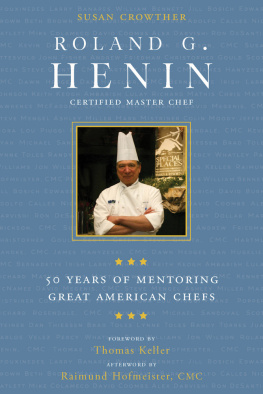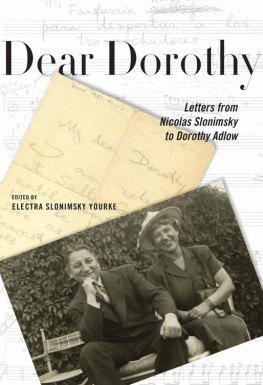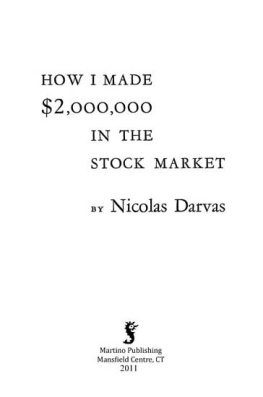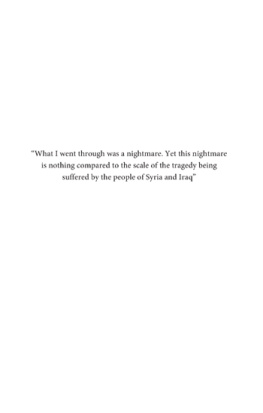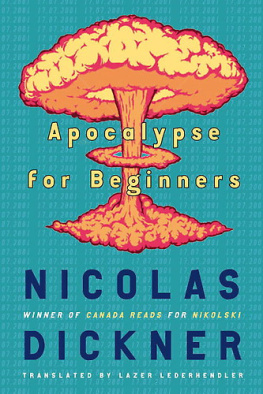Nicolas Hénin - Jihad Academy
Here you can read online Nicolas Hénin - Jihad Academy full text of the book (entire story) in english for free. Download pdf and epub, get meaning, cover and reviews about this ebook. publisher: Bloomsbury Publishing, genre: Politics. Description of the work, (preface) as well as reviews are available. Best literature library LitArk.com created for fans of good reading and offers a wide selection of genres:
Romance novel
Science fiction
Adventure
Detective
Science
History
Home and family
Prose
Art
Politics
Computer
Non-fiction
Religion
Business
Children
Humor
Choose a favorite category and find really read worthwhile books. Enjoy immersion in the world of imagination, feel the emotions of the characters or learn something new for yourself, make an fascinating discovery.
- Book:Jihad Academy
- Author:
- Publisher:Bloomsbury Publishing
- Genre:
- Rating:3 / 5
- Favourites:Add to favourites
- Your mark:
- 60
- 1
- 2
- 3
- 4
- 5
Jihad Academy: summary, description and annotation
We offer to read an annotation, description, summary or preface (depends on what the author of the book "Jihad Academy" wrote himself). If you haven't found the necessary information about the book — write in the comments, we will try to find it.
Jihad Academy — read online for free the complete book (whole text) full work
Below is the text of the book, divided by pages. System saving the place of the last page read, allows you to conveniently read the book "Jihad Academy" online for free, without having to search again every time where you left off. Put a bookmark, and you can go to the page where you finished reading at any time.
Font size:
Interval:
Bookmark:
THE RISE OF ISLAMIC STATE
Nicolas Hnin
Translated from French by Martin Makinson
B L O O M S B U R Y
NEW DELHI LONDON OXFORD NEW YORK SYDNEY
First published in India 2015
2015 by Nicolas Hnin
All rights reserved. No part of this publication may be reproduced or
transmitted in any form or by any means, electronic or mechanical, including
photocopying, recording, or any information storage or retrieval system, without prior
permission in writing from the publishers.
No responsibility for loss caused to any individual or organization acting on or
refraining from action as a result of the material in this publication can be
accepted by Bloomsbury or the author.
The content of this book is the sole expression and opinion of its author, and
not of the publisher. The publisher in no manner is liable for any opinion or views
expressed by the author. While best efforts have been made in preparing this
book, the publisher makes no representations or warranties of any kind and
assumes no liabilities of any kind with respect to the accuracy or completeness
of the content and specifically disclaims any implied warranties of
merchantability or fitness of use for a particular purpose.
The publisher believes that the content of this book does not violate any
existing copyright/intellectual property of others in any manner whatsoever.
However, in case any source has not been duly attributed, the publisher may
be notified in writing for necessary action.
BLOOMSBURY and the Diana logo are trademarks of Bloomsbury Publishing Plc
ISBN 978 93 85436 33 8
Bloomsbury Publishing India Pvt. Ltd
DDA Complex, LSC Building No.4
Second Floor, Pocket C 6 & 7, Vasant Kunj
New Delhi 110070
www.bloomsbury.com
To find out more about our authors and books visit www.bloomsbury.com.
Here you will find extracts, author interviews, details of forthcoming
events and the option to sign up for our newsletters.
The reader may be surprised not to discover in the following pages the story of my captivity. Of course, I could have written the usual book describing my capture by masked Islamic State militants in a street of Raqqa, Syria, on 22 June 2013. I could have told of my ten months as a hostage alongside two dozen Westerners, including the Americans James Foley, Steven Sotloff, Peter Kassig and Kayla Mueller, Britons David Haines and Alan Henning, and Russian Sergei Gorbunovall of them killed by their captors, who were also mine. I could have recounted the boredom, the fear and the suffering during the months I was deprived of my freedom, and finally my release in April 2014, after the negotiations conducted by my government. But the truth of the matter is that during these months I did not stop being a journalist.
Once free, I soon felt shockednot by the cruelty of the ordeal I had undergone, but by the mistakes made by the entire international community, which had led the Middle East I love to such a momentous tragedy. I was stunned by the fact that these mistakes were being repeated again and again. When we fail to learn from history, even from the most immediate past, history exacts its revenge and returns to haunt us.
Telling only the standard tale of a casualty of terrorism, drawing the readers attention to the ordeal endured, would have gone against my own beliefs. What I went through was a nightmare. Yet this nightmare is nothing compared to the scale of the tragedy being suffered by the people of Syria and Iraq. It is the great powers who have manufactured the conditions for this nightmare to come true, and who, at home, are creating the lost fanatics who willingly set off to fight in a war which is not theirs and whose issues they cannot grasp.
The world seems paralysed by fear of the people who took me hostage. These people are selling us a myth, in which they want to appear as super-terrorists, a new ultra-powerful generation. And we buy this myth. The world sees them as the very embodiment of evil and barbarity, wants to confront them, fight them. This is what Islamic State want, to drag the West on to its terrain. But I am not afraid. I know where these lost youths come from. I know their weaknesses. And I know above all how to deconstruct their myths, by draining the mire that produced them. This is what this book aims to do.
It was not accident, madness or provocation that made the US General David Petraeus express the view that Islamic State isnt our biggest problem in Iraq. He could have added it is not Syrias most unsolvable issue, even as he was explaining to me how he was profoundly worried about the continuing meltdown of Syria, which is a political Chernobyl. Until it is capped, it is going to continue to spew radioactive instability and extremist ideology in the entire region.
Despite what I have endured, despite Islamic States chilling deeds, I would like to invite people to assess this organisation in relative terms. I am not pursuing some kind of revisionism. I am saying it because first of all, in terms of terrorism, they have produced nothing fundamentally new or exceptional. And above all because putting their crimes in perspective enables us to do justice to the victims of state terrorism, who are ten times more numerous, and to remember that these jihadists who seek to spread fear among us are ultimately just a symptom, not a cause. They are only the fever. The disease is elsewhere.
I am not afraid, but I am worried. Worried about the future of a Middle East that still has a heavy price to pay for freedom. Worried about the world my children will inherit, in which terrorism feeds fear of Islam and xenophobia, in which the worlds crises elicit only security responses from developed countries, and in which barriers and surveillance replace efforts to understand. Hence this book: the work of a journalist. To invite people to ponder, to think critically, to escape clichs and the all-too-easy solutions that flood our media.
Nicolas Hnin
Paris, May 2015
Interview with Liz Sly, Washington Post, 20 March 2015.
The hills of Raqqa in the Euphrates valley, with their parched, stony gorges, achieved notoriety one fateful morning in August 2014. A video was posted online: the picture faded in to reveal a hostage in an orange jumpsuit and his taunting executioner brandishing a knife. A short harangue, a final provocation, and a last message from the victim to his family. Then one more murder under the Syrian sun.
James Foleys macabre execution was successful beyond its perpetrators dreams. The West was stunned. The summer holidays were over. Obama held a crisis meeting and Cameron cut short his holidays. After three years of waiting, inaction and procrastination, violence suddenly invaded our screens and forced us to react. Islamic State had thrust itself onto the agenda.
Yet we had seen Islamic State coming, since its reasonably amicable split from al-Qaidas official franchise in Syria, Jabhat al-Nusra. Islamic State has made relentless advances amid rampaging violence, rifts amid the Syrian opposition to the regime, and growing despair and frustration. Its progress seemed to halt in the spring, as armed groups in Syria engaged in internecine battles, but the deteriorating situation in Iraq gave it fresh momentum. Islamic State took Mosul almost without a shot being fired and established a caliphate. Or rather it restored a caliphate that had existed, uninterrupted, throughout Islamic history until 1924.
It was as if, with the murder in the Syrian desert, we had suddenly become aware of the challenge we faced from Syria, Iraq and the group that calls itself Islamic State.civil war, an American from New Hampshire had been killed in cold blood by a British national from East London.
Font size:
Interval:
Bookmark:
Similar books «Jihad Academy»
Look at similar books to Jihad Academy. We have selected literature similar in name and meaning in the hope of providing readers with more options to find new, interesting, not yet read works.
Discussion, reviews of the book Jihad Academy and just readers' own opinions. Leave your comments, write what you think about the work, its meaning or the main characters. Specify what exactly you liked and what you didn't like, and why you think so.

